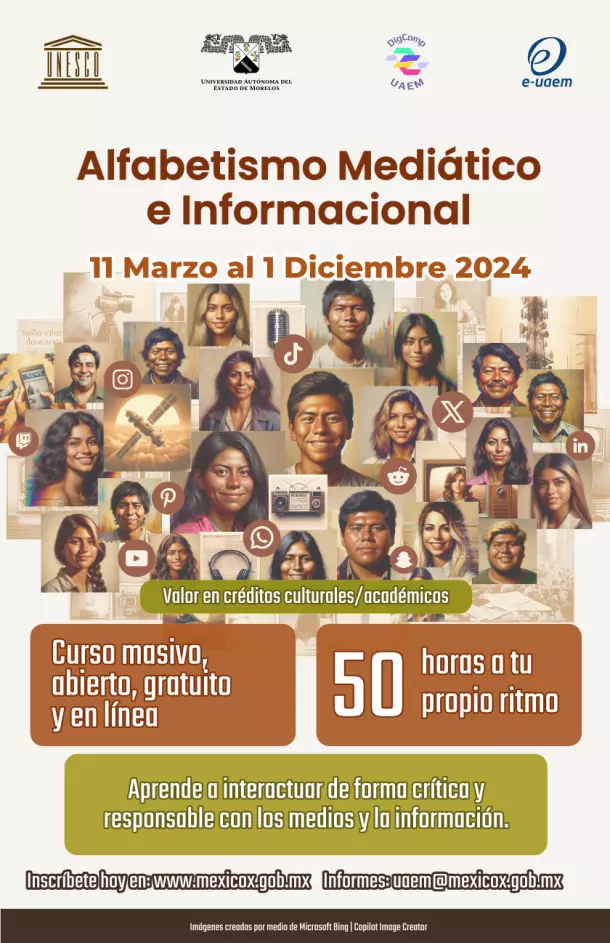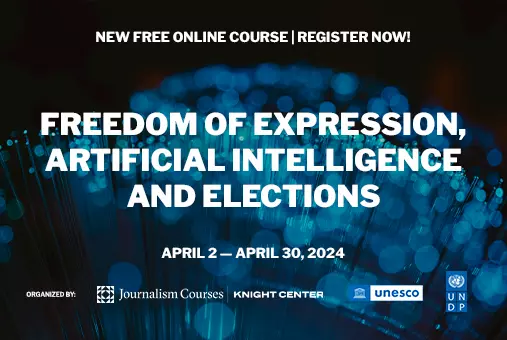Women and men of all ages need new types of Media and Information Literacy competencies in today’s digital world. This is urgent as people face with choices between privacy and safety on the Internet, and between freely expressing themselves and the ethical use of information, digital technologies, and media. – Education for all must therefore include Media and Information Literacy (MIL) for all.
UNESCO’s push to achieve media and information literate societies recognizes that MIL in formal education is a necessity, but not a final stop. Attaining MIL in formal education has been long and slow process. However, the momentum must be kept up. MIL must also go beyond the classroom.
To increase access to MIL training, UNESCO has supported the development of Massive Open Online Courses (MOOC) on MIL in multiple languages, in cooperation with different partners.
Freedom of Expression, Artificial Intelligence & Elections
Target group: Electoral practitioners, regulators, media professionals.
Language: English – French – Arabic – Spanish – Portuguese
Initial Offer Period: self-paced between 2 – 30 April 2024
VIDEO
============================
The Deep Dive for Policymakers into Media and Information Literacy MOOC

Target group: Policymakers
Language: English
Initial Offer Period: self-paced between 1 April – 31 August 2024
This practical course is a collaborative effort between UNESCO, the United Nations University, and the Autonomous University of Barcelona. This self-paced online course focuses on the application of media and information literacy to public policy, with a multi-view perspective and case studies. The aim of the course is to equip government officials, technocrats, policymakers, heads of private and public institutions with the tools to articulate and implement media and information literacy at national and institutional levels. This is an opportunity for leaders to take charge and shape the future of media and information literacy.
==============================
Media Literacy: Fostering A Cognitive-Emotional Approach

Target group: Learners (13+) and educators
Language: English
Offer Period: Anytime
This self-directed and interactive course created by the UNESCO Mahatma Gandhi Institute of Education for Peace and Sustainable Development aims to help learners gain a deep understanding of media literacy and recognize its significance in both their daily lives and society as a whole. Employing the Libre pedagogical framework, which encourages various teaching methods, including Reflection, Discussion, Inquiry, Storytelling, Simulations and Games, this course can be seamlessly integrated into regular teaching and learning practices!
=========================
MOOC: Think Critically, Click Wisely: Media and Information Literacy in the next normal

Target group: Educators and learners
Language: English – Spanish
Offer Period: Anytime
This audio-MOOC follows the latest version of the UNESCO Media and Information Literacy Curriculum for Teachers, a pioneering document that presents a broad framework of competencies and pedagogical suggestions for educators and students to navigate today’s communication ecosystem with critical thinking and wisdom. This resource connects Media and Information Literacy to emerging issues such as artificial intelligence, education for digital citizenship, education for sustainable development, cultural literacy and the exponential increase in misinformation.
========================
The Media and Information Literacy for Inclusive and Better Futures for educators and learners

Target group: Educators and learners
Language: English
Offer Period: Anytime
This course is aimed at equipping educators and learners of all ages to acquire the skills to effectively analyze online information. The course is developed by Athabasca University in partnership with UNESCO and provides the necessary tools to identify misinformation and make informed decisions about the information they consume and share. Participants will become well-informed digital citizens, capable of safely navigating the digital world.
=======================
Alfabetismo Mediático e Informacional (Media and Information Literacy)
Target group: General/Spanish-speaking audience
Language: Spanish
Present Offer Period: self-paced between 11 March – 1 December 2024
READ ALSO: MILID Foundation, UNESCO to mark 2024 Global MIL Week in Kano
This introductory course encompasses the concepts of media and information literacy and their significance in driving social action. It delves into the skills required to search, evaluate, analyze, interpret, and utilize information across various platforms. Additionally, it covers topics such as intellectual property rights, the importance of freedom of expression in society, diverse representations and stereotypes, intercultural dialogue, cultural diversity, ethical considerations in information dissemination, civil society’s role in media, and the digital competencies essential for young individuals. It aims to equip learners with the critical skills necessary to navigate through the deluge of information and approach it with a discerning eye.
=========================
Alfabetizaçao e letramento midiático, informacional e diálogo intercultural (Media literacy, information literacy and intercultural dialogue)

Target group: General/Portuguese-speaking audience
Language: Portuguese
Offer Period: Anytime
This entry-level course is based on the recent phenomenon in Brazil, which is the presence of a large amount of information via the digital world. It will show different ways of what we can do with this exponential growth of media and how to participate in the construction of digital content in a sober and safe way. Additionally, it sought advice from several community leaders, and you will have access to their insights and analysis in the videos for each week of the course. This course, from modules 1 to 10, is a translation and adaptation of the UNESCO Media and Information Literacy Curriculum. It is administered by the State University of Campinas (UNICAMP).



